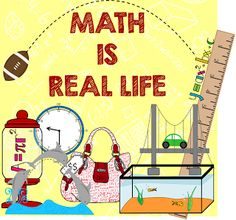Maths. That word has filled me with fear and dread for my whole life. Maths is a subject which I find extremely difficult. The different concepts, the rules, there being only one correct answer is something I have had difficulty understanding for years. I’m not sure if my difficulties in maths developed from the idea that “you can only be good at either English or maths; you cannot be good at both.” From a young age this is the statement you hear from parents, friends and teachers. There may have been a point in my life where I just accepted my strength was English and that if you could only be good at one, why try? After school when again will I need maths? How wrong was I… 
Firstly, the idea of you can only be good at maths or English is just ludicrous. There are many people who have a natural ability to be good at both, I know as I have witnessed it. From colleagues, to friends and the pupils I taught on placement they have opened my eyes to the fact that yes, you can be good at both. Do not get me wrong you may be stronger at one or enjoy one more but what is stopping a person being good at both. This is backed up by Eastaway and Askew who state that there is “no such thing as a maths gene.” (Eastaway and Askew, 2013, p14.) They discuss that mathematics has been around for hundreds of years and that today’s society are much more mathematically sophisticated compared to those in medieval times, therefore how could there be a gene that programmed us to “be good at maths.” (Eastaway and Askey, 2013, p15.) I understand people can argue that maths has developed heavily over the last few centuries however my argument would be if we were all genetically programmed with a “maths genes” then why were people in the medieval times not as developed as us?
Secondly, the concept of you do not need maths after you have left school does make me laugh, now. For years I was a firm believer of “when will I need maths again?” Fast forward a few years and here I am standing in front of a class teaching them angles, fractions and decimals. All the things “I would never need to use again”. Maths plays such a heavy influence in day to day life. We need it for such basic things such as setting an alarm clock or calculating change. As we grow older we need maths for knowing how to drive or buying a house. Without mathematics these things we do each day without thinking would prove extremely difficult. In modern day society maths is an essential qualification to have when applying for most jobs. Whether we like it or not we do need maths and it is deemed a requirement in society. (Eastaway and Askey, 2013, p21.)
Predominately, the reason why I chose the ‘Discovering Mathematics’ elective was due to my anxiety about maths. People’s anxiety from mathematics can stem from many different things. Eastaway and Askey state that people’s mathematics anxiety can develop from a parent or teacher but mainly it is not the fear of maths itself but the fear of being shamed. (Eastaway and Askey, 2013, p15.) Personally, I feel one of the reason as to why I feel anxious mathematics was due to the way I was taught it. We were given brief explanations about the methods and explanations and then set on to a task from a text-book. This method never worked for me. As a learner I need to be able to relate it too real-life. When I become a teacher I strive to ensure that when teaching mathematics, I will relate it too real-life as much as I possibly can. This will give the children an insight as to why they need maths and I hope that they will never be asking themselves “when will I use this again?”
Eastaway, R., Askew, M. (2013) Maths for Mums and Dads. Square Peg. London.


